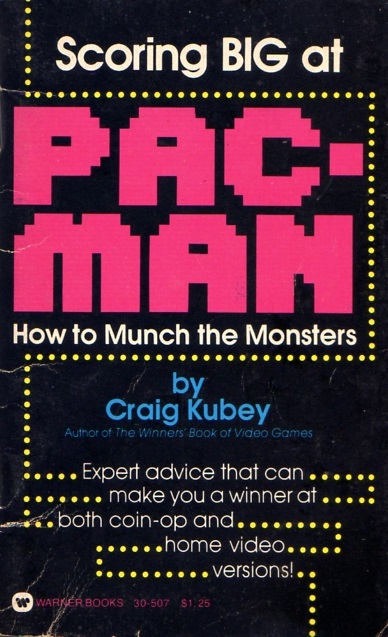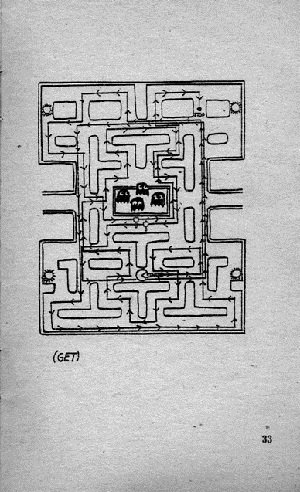
You want to talk about throwbacks to an earlier era? Let's march through history and take a look at one of the grandfathers of the modern-day, full-color, tome-sized books we call strategy guides.
Back in 1982, arcades were in full swing. The very idea of a 'video game crash' was impossible to conceive: Asteroids in a single year pulled in nearly $800 million worth of quarters, enough to eclipse Gone With the Wind's forty year run as the highest-grossing film in cinematic history. Space Invaders was displacing Baseball as a national pastime. Defender menaced Sheena Easton. It was madness!
Then came Pac-Man, and the world would never be the same.
Pac-Man, with its simple single joystick control scheme and maze-navigation gameplay, captured the attention of everybody: child or senior citizen, man or woman, teenagers on the weekend or office workers on their lunch breaks, nobody, not even Buckner and Garcia, was immune to Pac-Man Fever.
Into this crazy world of electronic entertainment came Craig Kubey, a 32-year old lawyer turned game master at the behest of two of his siblings. That's right: before Jeff Rovin and his sons started winning at Nintendo, Craig and his brother were Scoring Big at Pac-Man.
To Guide or Not to Guide?
At 48 pages, the size of a pocket paperback, and with a cover price of $1.25 (though it costs significantly more these days), calling Scoring Big at Pac-Man a "guide" seems, uh, generous, but "To Pamphlet or Not to Pamphlet" lacks the same oomph, so here we are.
It's a simple book, but at its core are strategies not only unseen at the time, but largely forgotten today. Three friends calling themselves the GET Brothers (their first names are George, Ed, and Tom) developed their own patterns for play. Author Kubey tracked these guys down in their home town of Davis, California, interviewed them, learned their patterns, then sketched them out to get them into the book:

Screenshots? We don't need no stinkin' screenshots...
But the arcade's only part of the story. By this time, Pac-Man was available on the Atari VCS and while Kubey doesn't offer up any patterns for victory (not surprising, since there aren't any that work with 100% reliability), he does explain the main differences between the arcade machine and its home-based counterpart. Remember, this is 1982 we're talking about: no internet, no YouTube demonstration videos, no GameFAQs. If you wanted to get better at Pac-Man (or any game, really) you had to either find friends who were better and could teach you, or you brute forced you way to the top of the high score charts through unrelenting practice. This was Kubey's attempt to 'cut out the middle man' and give players a starting point, something to aim for, with something small enough to be carried in one's back pocket or purse.
That's pretty damn awesome, if I say so myself. Thanks to the rise of emulation and classic gaming as a whole, the patterns developed by the GET Brothers and documented here by Kubey are still effective and worth learning, especially if you're interested in competitive play.
Despite its lack of screenshots, this book actually goes beyond what we think of as a 'strategy guide' today. Because of that, I'd say it belongs in any serious gaming historian's library, and if you get the opportunity to browse through it, you can literally feel the 80's nostalgia wafting off the pages.
Sticky floors, caramel corn, and cigarette smoke not included.
A nice post in my eyes 😊 Resteemed by @peekbit to say “thank you“ since you are one of my esteemed followers.
Read about my attempt in contributing to the bright side of life.
Some remarks about my resteeming.
Downvoting a post can decrease pending rewards and make it less visible. Common reasons:
Submit
Nice post... have loved to read it... 😊 @peekbit
Downvoting a post can decrease pending rewards and make it less visible. Common reasons:
Submit
Did you grow up with Pac-Man, @peekbit? You seem a little too young. :)
Downvoting a post can decrease pending rewards and make it less visible. Common reasons:
Submit
no no - far before my time... 😔 but once I was in a museum with computer tech stuff... and there you could even play it with on an old computer with with a really small screen an old joy stick. Very funny... And these ping-pong game too... 😊 @peekbit
Downvoting a post can decrease pending rewards and make it less visible. Common reasons:
Submit
While you are attempting to Score Big..... I'll be over here.. MASTERING PAC-MAN
Stats I guess you may enjoy since I pulled this out: 128 pages, "Screenshots" are same style as your guide, except this one is from 1981, so doesn't have the advanced ghost graphics of your book, only black dots lol. Got mine years ago at some house that got flooded who had a sale of everything in the house, book was beat up but probably only cost me a buck if not less, I just remember being amazing at a guide this big for such a simplistic game, but then going through it, I understood, such depth!
Very awesome to see yours up, just knowing the market was so big a second guide was made the very next year lol.
Downvoting a post can decrease pending rewards and make it less visible. Common reasons:
Submit
I've got a copy of Mastering Pac-Man! It's fun reading, and quite different from Kubey's book, that's for sure.
Pac-Man, as far as I can tell, was the progenitor of game strategy guides. There were books written about playing and/or beating video games prior to Pac-Man (Tom Hirschfeld's 1981 book How to Master the Video Games, for instance) , but that little yellow orb with the pie-shaped wedge opened the can of worms. After that, you started seeing guides written specifically to explain strategies for Defender, Donkey Kong, Centipede, and so forth. From there was born the idea of books written about individual games. :)
This right here was my first Pac-Man guide though. Also from 1982, published by Pocket Books. 32 pages of full color illustrations for $2.25. Eat your hearts out, Uston and Kubey. ;)
Everybody wrote one of these things at some point. :D
And if you're interested in a better copy, @cryplectibles, Uston re-released Mastering Pac-Man in 2014, "by popular demand". What goes around comes around. :)
Downvoting a post can decrease pending rewards and make it less visible. Common reasons:
Submit
I never really played much Pacman tbh, i would always play the gun games like time crisis when i was in the arcade...
Downvoting a post can decrease pending rewards and make it less visible. Common reasons:
Submit
These guides were a big part of my life!
Downvoting a post can decrease pending rewards and make it less visible. Common reasons:
Submit
So should they have been for all of us, @sequentialvibe! :)
Downvoting a post can decrease pending rewards and make it less visible. Common reasons:
Submit
I think the emulation of computer game is great ! I remember that the only one thing I looked forward to was score of a game. Now , every game has it's own story. How nice these three friends are to learn their patterns and to write it into the book..awesome !
Downvoting a post can decrease pending rewards and make it less visible. Common reasons:
Submit
I remember this (I think) big multi-part Internet article all about Pac-Man, talking about someone who got a record high score on it and did so not my utilizing patterns (I believe this book was mentioned in it) but by memorizing the different ways the ghosts were programmed. If only I could remember where it was!
Downvoting a post can decrease pending rewards and make it less visible. Common reasons:
Submit
Fantastic final line.
Downvoting a post can decrease pending rewards and make it less visible. Common reasons:
Submit
It seems like this is a universal memory for anyone who grew up in the 80's when it comes to arcades. It certainly is for me. :)
Downvoting a post can decrease pending rewards and make it less visible. Common reasons:
Submit